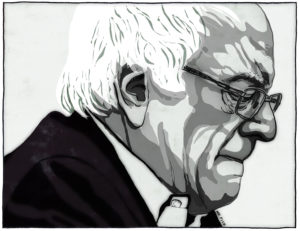Money Talks
George Clooney is a big-time movie star. Cate Blanchett is a big-time movie star. But Tyler Perry's new movie did more box office on its opening weekend than Clooney's and Blanchett's new movies combined -- which makes Perry a big-time movie star, too, and also a phenomenon.WASHINGTON — George Clooney is a big-time movie star. Cate Blanchett is a big-time movie star. But Tyler Perry’s new movie did more box office on its opening weekend than Clooney’s and Blanchett’s new movies combined — which makes Perry a big-time movie star, too, and also a phenomenon.
Perry’s “Why Did I Get Married?” which features singers Janet Jackson and Jill Scott, ruled the weekend with $21.5 million in sales. Clooney’s thriller “Michael Clayton” struggled to earn half that much, while Blanchett’s costume drama, “Elizabeth: The Golden Age,” barely broke $6 million.
What makes this worth noting? According to Perry’s distributor, Lions Gate Films, around 90 percent of the audience for “Why Did I Get Married?” was African-American. The ensemble cast is African-American, too.
A playwright, actor and filmmaker — based not in Hollywood but in somewhat less glamorous Atlanta — Perry is making a habit of pulling this kind of stunt. Last year his “Madea’s Family Reunion” opened with a $30-million weekend. Critics find Perry’s films formulaic, but clearly he has found a formula that works. And he has found an untapped audience that literally can’t wait to see itself on the big screen.
In his plays and movies, Perry shows African-Americans as they … well, I was about to say he shows us as we really are, but that’s not true. Reality is for documentaries; Perry’s characters are unsubtle, his humor is broad and his plots are soaked with melodrama. Among his big themes are love, fidelity and the importance of family, and his movies usually have religious overtones.
What Perry does is depict black Americans as people relating to other people — not as mere plot devices, and not as characters defined solely by how they relate to the white world. The rest of the movie industry would do well to take note.
In depicting African-Americans, mainstream Hollywood still struggles to leave behind the “Magic Negro” paradigm — the idea, epitomized by “Driving Miss Daisy,” that black characters exist solely to teach valuable lessons to white characters. We still don’t get a lot of films in which black characters bestow their moral wisdom on one another. Even in “The Pursuit of Happyness,” Will Smith’s character was only secondarily a lesson-giver to his son; mostly, his role was to teach and uplift the audience.
There’s nothing wrong with a little inspiration. But African-American moviegoers who want to see their own concerns and struggles — their own lives, even if rendered in broad outline — projected at the cineplex still aren’t getting much love from Hollywood.
The same is true on the small screen. A new Nielsen report says that there has been a remarkable convergence of white and black television viewing habits; for the first time in years, lists of the top 20 shows among white and blacks are largely the same. But that is at least partly due to the fact that UPN and WB, which used to carry a lot of black-oriented programming, were merged into one network, which meant jettisoning a number of shows popular with black viewers. And it’s at least partly due to the dominance of “American Idol,” “Dancing With the Stars” and other reality shows that choose their contestants with diversity in mind.
Nielsen calls African-Americans a “high-growth, high-potential audience.” African-Americans are “embracing and using the newest technologies at rates that exceed the national average,” including high-definition television and movies-on-demand, Nielsen reports.
But black viewers still won’t watch “Desperate Housewives.” They’d rather watch “Girlfriends” instead.
Perry’s movies are based on his stage plays, which play to packed audiences around the country. “Why Did I Get Married?” is about the black middle class. It’s about relationships, the universal subject of date movies. Perry’s movies aren’t great art-house films, but neither are Adam Sandler’s; they succeed at what counts, which is speaking to their audience.
Tom Ortenberg, president of Lions Gate Films, told the Los Angeles Times that Perry’s “message of family values and personal redemption speaks very strongly to people who are not frequent moviegoers.” He added, “My strong hunch is that this is the last time anybody will underestimate Tyler Perry.”
“African-Americans have learned to flex their market muscle,” Nielsen said in its report, noting that African-American buying power will top $900 billion within a few years.
If the pattern from his earlier films holds true, “Why Did I Get Married” is likely to see a drop-off next weekend — black audiences anticipate his films and rush out to see them as soon as they open. That eagerness suggests a hunger that others might want to try to satisfy. That is, if they want to make money.
Eugene Robinson’s e-mail address is eugenerobinson(at)washpost.com.
© 2007, Washington Post Writers Group
Your support matters…Independent journalism is under threat and overshadowed by heavily funded mainstream media.
You can help level the playing field. Become a member.
Your tax-deductible contribution keeps us digging beneath the headlines to give you thought-provoking, investigative reporting and analysis that unearths what's really happening- without compromise.
Give today to support our courageous, independent journalists.






You need to be a supporter to comment.
There are currently no responses to this article.
Be the first to respond.